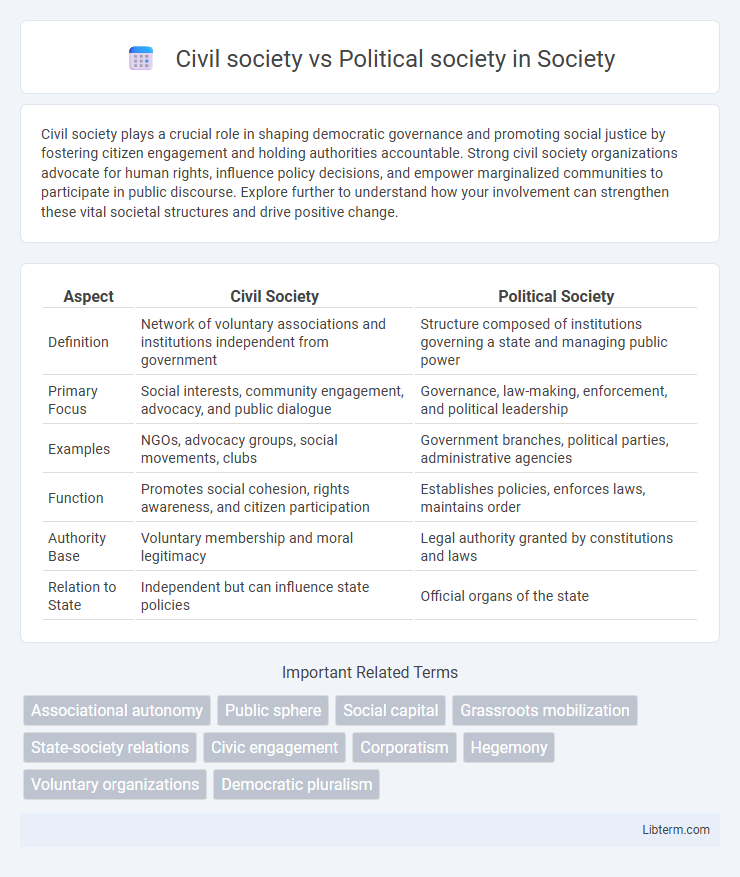Civil society plays a crucial role in shaping democratic governance and promoting social justice by fostering citizen engagement and holding authorities accountable. Strong civil society organizations advocate for human rights, influence policy decisions, and empower marginalized communities to participate in public discourse. Explore further to understand how your involvement can strengthen these vital societal structures and drive positive change.
Table of Comparison
| Aspect | Civil Society | Political Society |
|---|---|---|
| Definition | Network of voluntary associations and institutions independent from government | Structure composed of institutions governing a state and managing public power |
| Primary Focus | Social interests, community engagement, advocacy, and public dialogue | Governance, law-making, enforcement, and political leadership |
| Examples | NGOs, advocacy groups, social movements, clubs | Government branches, political parties, administrative agencies |
| Function | Promotes social cohesion, rights awareness, and citizen participation | Establishes policies, enforces laws, maintains order |
| Authority Base | Voluntary membership and moral legitimacy | Legal authority granted by constitutions and laws |
| Relation to State | Independent but can influence state policies | Official organs of the state |
Defining Civil Society and Political Society
Civil society comprises organizations and institutions independent of the government that enable individuals to organize, express interests, and influence social and political life through non-state forums. Political society refers to the state apparatus and formal political institutions, including government bodies and elected representatives, tasked with policy-making, governance, and coercive power enforcement. Defining civil society emphasizes voluntary associations and public participation beyond formal political structures, while political society centers on institutionalized authority and legal control within a sovereign state.
Historical Evolution of Both Spheres
Civil society emerged as a space for voluntary associations, social movements, and non-governmental organizations that operate independently from the state, tracing its roots to Enlightenment ideas promoting individual rights and public engagement. Political society evolved through the establishment of formal institutions such as governments, political parties, and legal frameworks aimed at exercising state authority, with origins in ancient democracies and evolving through the development of modern nation-states. The historical evolution of civil and political societies highlights a dynamic interplay where civil society acts as a watchdog and advocate for public interests, while political society organizes power and governance within structured systems.
Key Functions of Civil Society
Civil society plays a crucial role in promoting social cohesion, protecting human rights, and fostering public participation beyond governmental control. It serves as a watchdog that holds political society accountable by advocating transparency and responding to citizens' needs. Civil organizations mobilize resources, facilitate dialogue, and empower marginalized groups, strengthening democratic governance and social accountability.
The Role of Political Society in Governance
Political society plays a crucial role in governance by structuring power relations and decision-making processes through formal institutions such as governments, political parties, and legal frameworks. It establishes authority, implements laws, and enforces policies that maintain order and address public interests. The interaction between political society and civil society influences accountability, representation, and the legitimacy of governing bodies.
Interactions Between Civil and Political Societies
Civil society operates as a sphere of social life where individuals and groups independently organize to express interests and values, while political society comprises institutions and authorities responsible for governance and policy enforcement. Interactions between civil and political societies shape democratic governance by allowing civil society to influence public decision-making, advocate for rights, and hold political actors accountable. These dynamic exchanges foster political participation, social mobilization, and responsiveness, enhancing the legitimacy and effectiveness of political systems.
Civil Society as a Check on Political Power
Civil society acts as a crucial check on political power by fostering citizen engagement, promoting transparency, and holding government institutions accountable through advocacy, activism, and independent oversight. Organizations such as non-governmental organizations (NGOs), advocacy groups, and grassroots movements mobilize public opinion to challenge abuses of authority and influence policy decisions. By creating a sphere of active participation and dialogue outside formal political institutions, civil society strengthens democratic governance and prevents the concentration of unchecked power in political society.
Influence of Political Society on Public Policies
Political society wields significant influence over public policies through formal mechanisms such as elections, legislative processes, and government institutions that directly shape lawmaking and policy enforcement. Unlike civil society, which operates through advocacy, social movements, and grassroots initiatives to indirectly impact policy, political society holds authoritative power to create and implement regulations. This direct control enables political actors to prioritize agendas, allocate resources, and institutionalize changes affecting national governance and public welfare.
Challenges Facing Civil Society in Modern States
Civil society in modern states faces challenges such as shrinking civic spaces, restrictive government regulations, and reduced funding opportunities, which hinder its ability to advocate and operate independently. Political society often controls formal power structures, limiting civil society's influence on policy-making and amplifying risks of co-optation or suppression. Navigating the fine line between collaboration and autonomy remains a persistent struggle for civil society actors seeking meaningful impact.
Case Studies: Civil vs Political Society Across Countries
Case studies comparing civil society and political society reveal varied interactions across countries, emphasizing their distinct roles in governance and social mobilization. In Brazil, a robust civil society actively influences political decisions, contrasting with China where political society, dominated by the Communist Party, limits autonomous civil engagement. South Africa demonstrates a hybrid model where civil society organizations collaborate with political actors to advance democratic reforms post-apartheid.
Strengthening Democratic Institutions Through Balanced Societies
Civil society, comprising non-governmental organizations, community groups, and civic associations, fosters citizen participation and accountability, which strengthens democratic institutions by promoting transparency and social cohesion. Political society, consisting of formal governmental structures and political parties, exercises power through policy-making and enforcement, ensuring order and institutional stability. Balancing the active engagement of civil society with the authority of political society enhances democratic resilience by integrating grassroots input with effective governance mechanisms.
Civil society Infographic

 libterm.com
libterm.com